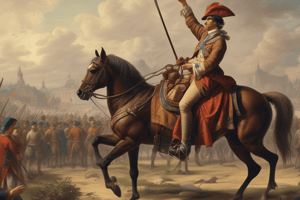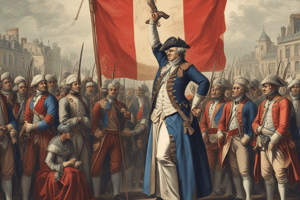Podcast
Questions and Answers
What is the financial situation of France during the reign of King Louis XVI?
What is the financial situation of France during the reign of King Louis XVI?
France is in a financial crisis, with the king and his advisors unable to manage the country's finances.
What is the main criticism of Queen Marie Antoinette's spending habits?
What is the main criticism of Queen Marie Antoinette's spending habits?
She is criticized for her extravagant spending, earning her the nickname 'Madame Deficit'.
What is the significance of the Enlightenment philosophy in the context of the French Revolution?
What is the significance of the Enlightenment philosophy in the context of the French Revolution?
It is gaining popularity, with thinkers across France and beyond questioning the authority of the monarchy.
What is the main grievance of the Third Estate against the system?
What is the main grievance of the Third Estate against the system?
What is the consequence of King Louis XVI's decision to finance the American colonies?
What is the consequence of King Louis XVI's decision to finance the American colonies?
What is the perception of the nobility among the French people during this time?
What is the perception of the nobility among the French people during this time?
What was the main concern of the majority of the French population during the French Revolution?
What was the main concern of the majority of the French population during the French Revolution?
What event marked the beginning of the French Revolution on July 14, 1789?
What event marked the beginning of the French Revolution on July 14, 1789?
What was the main reason for the people's discontent with King Louis XVI?
What was the main reason for the people's discontent with King Louis XVI?
What was the significance of the Tennis Court Oath on June 20, 1789?
What was the significance of the Tennis Court Oath on June 20, 1789?
Who were the two young lawyers who became prominent figures in the Revolution?
Who were the two young lawyers who became prominent figures in the Revolution?
What event was sparked by the king's inability to see the people's problems, leading to widespread discontent?
What event was sparked by the king's inability to see the people's problems, leading to widespread discontent?
Flashcards are hidden until you start studying
Study Notes
Here is a summary of the text in detailed bullet points:
• The video is possible thanks to Nord VPN, offering 75% off for a limited time, with an additional free month.
• The French Revolution is now available in the store, including King Louis and Marie Antoinette's full character with separation.
• The royal couple's lavish lifestyle is contrasted with the poverty and hardship of the common people.
• France is in a financial crisis, with the king and his advisors unable to manage the country's finances.
• The people are angry and frustrated, questioning the monarchy's ability to lead the country.
• The Enlightenment philosophy is gaining popularity, with thinkers across France and beyond questioning the authority of the monarchy.
• The news of the king's death spreads, and Prince Louis becomes King Louis XVI in May 1774, but he is weak and incompetent.
• The king's advisors manipulate him, and he makes poor decisions, including trying to take revenge on the British by financing American colonies.
• The French people are suffering, and the nobility continues to live lavishly, ignoring the problems of the common people.
• Queen Marie Antoinette is criticized for her extravagant spending, earning her the nickname "Madame Deficit."
• The people are unhappy with the taxation policies, which heavily burden the poor, and the nobility is seen as corrupt and out of touch.
• The Third Estate, representing the common people, is frustrated with the system and demands change.
• The Estates-General is called upon to address the financial crisis, but the Third Estate is largely ignored.
• The people are angry, and the situation is volatile, with some advocating for violence and others calling for peaceful reform.
• The National Assembly is formed, and the Third Estate takes control, demanding more equality and economic reform.
• The king is forced to make concessions, but it may be too late, as the people are already mobilizing against him.
• The Tennis Court Oath is taken on June 20, 1789, where the National Assembly vows to continue their work on a new constitution.
• Maximilien Robespierre and Georges Danton, two young lawyers, become prominent figures in the Revolution.
• The Jacobin Club is formed, advocating for more radical change and eventually leading to the fall of the monarchy.
• The king's situation becomes increasingly precarious, and he is forced to call upon the army to quell the uprising.
• The people of Paris are afraid of the king's plans and suspect that he is plotting against them.
• The National Assembly declares the creation of the National Guard, and many French soldiers defect to the revolutionary side.
• On July 14, 1789, a large crowd storms the Bastille, marking the beginning of the French Revolution.
• The governor of the Bastille, De Launay, is forced to surrender, and the crowd gains access to the prison and its armory.
• The fall of the Bastille marks a turning point in the Revolution, as the people gain control and the monarchy begins to lose its grip on power.
• The Revolution becomes increasingly violent, with some advocating for moderation and others calling for more radical action.
• Marat, a radical journalist, writes inflammatory articles that contribute to the escalation of violence during the Revolution.
- The French people were unhappy with King Louis XVI due to high bread prices and inequality.
- Thomas Jefferson's Declaration of the Rights of Man and Citizen was influential in promoting freedom and equality.
- The majority of the French population was not concerned with the ideals of equality as much as they were worried about their daily struggles, including access to affordable bread.
- King Louis XVI lived in Versailles, 20 kilometers southwest of Paris, isolated from the people's concerns.
- On October 5, a crowd of 7,000 strong women marched to the Palace of Versailles, demanding the king take action to address their concerns.
- The women's march was sparked by the king's inability to see the people's problems, leading to widespread discontent and anger.
- The crowd's demands included the king's recognition of the people's struggles and the need for basic human rights, including food and nutrition.
- The event led to the storming of the palace, the killing of several members of the royal guard, and the eventual forced relocation of the king to Paris.
- The king was forced to accept the new revolutionary government and share power with the people.
- The event marked a significant turning point in the French Revolution, highlighting the people's desire for equality and freedom.
- Nord VPN is a secure and private internet browsing service that allows users to access servers in over 60 countries, with over 5000 servers, and has a 30-day money-back guarantee.
Studying That Suits You
Use AI to generate personalized quizzes and flashcards to suit your learning preferences.




